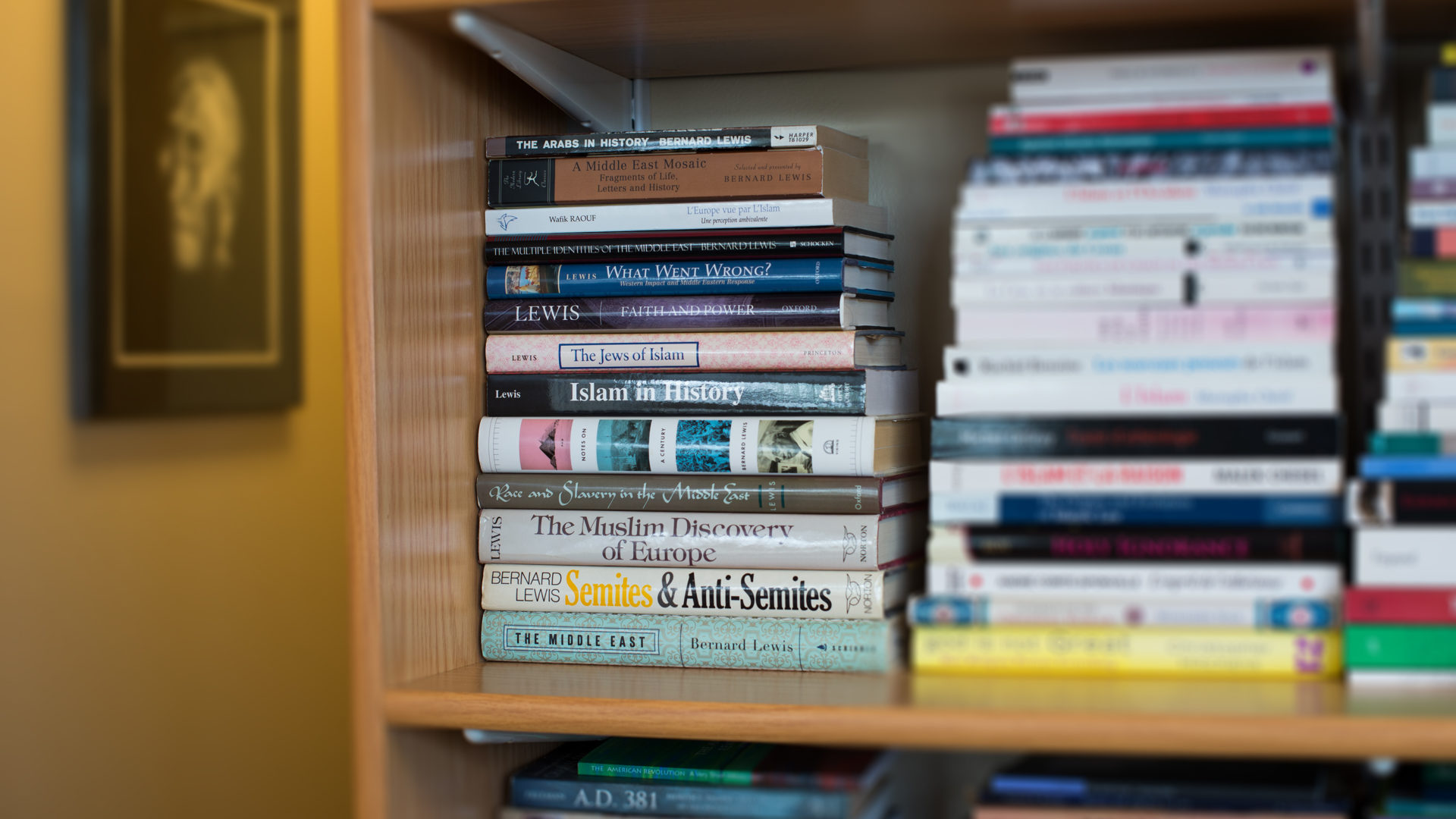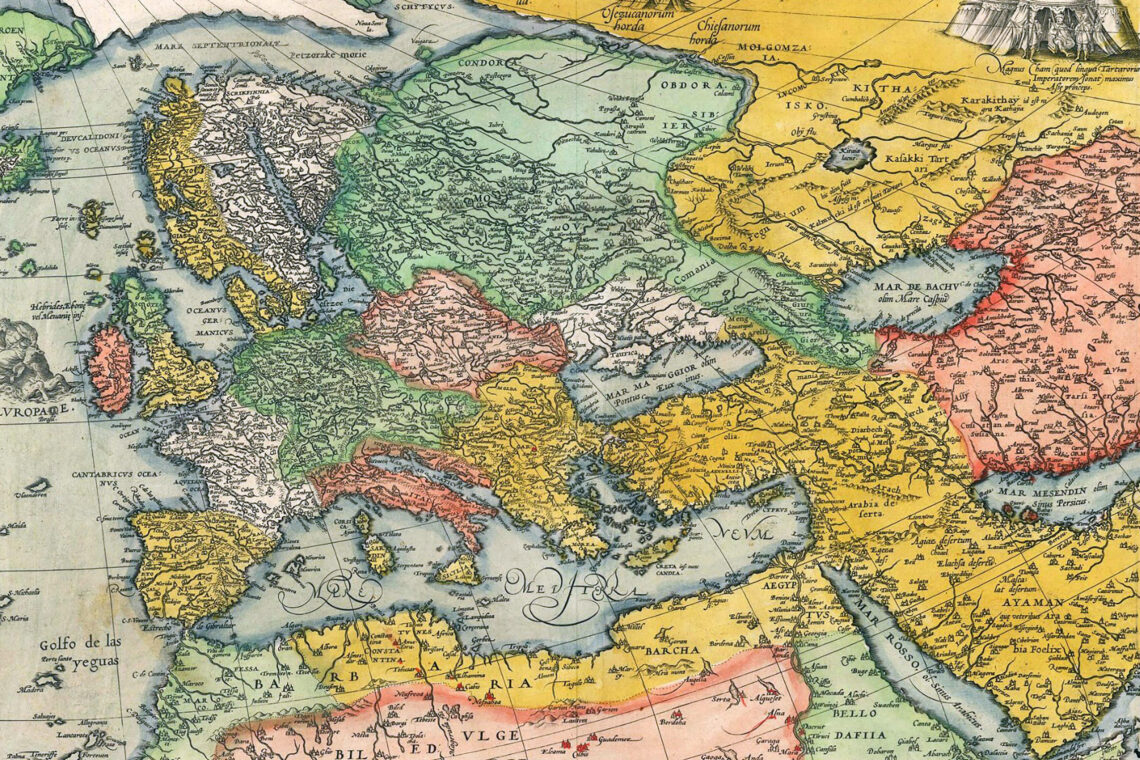I own twelve books by Bernard Lewis and they are all stacked horizontally on the left corner of one of my bookshelves in the office. I first heard about Lewis in the summer of 1985, when I was living in New York City. I had read a review of his latest book then, The Jews of Islam, in the New York Times Book Review, clipped the review, and rushed to the bookstore to get my copy. I was gripped by a powerful sensation when I was reading it. The reason was quite simple: I had never, until then, read any book about the history or religion of the Jews. I knew Jews only through the few acquaintances I had in Morocco and through the stereotypes I had inherited from my earliest childhood. Knowing Jews in New York dispelled many of them, but Lewis’s book was my first reading foray into the subject. It was all new and captivating.
I kept an eye on Lewis’s work and read with pleasure whatever I had time for. Then, at some point, when I entered the fray of postcolonial studies, I ran into the image created for him by Edward Said, author of Orientalism. If memory serves, Lewis was portrayed as an insincere Orientalist trading in damning generalities. This image proved hard to dispel, although we occasionally have corrective accounts—such as Daniel Martin Varisco’s exhaustive study of Said’s work in Reading Orientalism: Said the Unsaid—to show that Said was too cavalier with his verdicts. In any case, whenever I told Arab or Muslim friends that I was reading Lewis, or enjoying one of his books, I got disapproving looks, as if I were betraying some Arab or Muslim code established for us by Said himself.
Time passed and I eventually got to read both men’s memoirs. They are both powerful accounts of whirlwind lives in the 20th century, but it is Bernard Lewis’s story that I find most captivating. His just published memoirs, Notes on a Century (my 13th book on the shelf), written with the assistance of his latest love, Buntzie Ellis Churchill, one of the several women he lived with or married in the course of almost a century, is the account of a born historian, the first in England to dedicate himself to the Middle East. The only child of a solidly middle-class Anglo-Jewish couple, a boy who was hopelessly unsuited for any sport, Lewis developed an ear for languages and an appreciation for reading and writing. By the time he graduated from high school, he was versed in several languages, including Hebrew.
At first, Lewis dreamt of being a writer. “I cherished delusions of a literary career, seeing myself first as a poet and then an essayist, and until my teens,” he writes, “I thought that this was going to be my vocation.” Alas, Lewis couldn’t be creative so history was the next best option. He studied the law after graduating first in his class and won a significant prize, but the law left him somewhat cold, although he did enjoy the study of Roman law. So he went back to graduate school.
Lewis’s doctoral thesis was on the Shi`ite sect of the Isma`ilis, partly because of his sympathies for Marxism at that time. It was published in book form as The Origins of Isma`ilism in 1940. Soon, he was teaching students from Muslim countries at the School of Oriental and African Studies at the University of London. When his father wondered why Middle Eastern students would come to Great Britain to study their own histories, he put his finger on a puzzle that is with us still. The answer, though not given, is, unfortunately, all too obvious.
Lewis’s academic work was interrupted by service in the army and Britain’s intelligence agency MI6 during World War II. Lewis is not at liberty to reveal secrets, but a funny episode during that time is when he and his colleagues intercepted Saudi phone conversations without the latter having a clue that such things were possible. It was a lesson for Lewis, too. That experience induced in him “an almost neurotic fear of telephone conversations.” Also, during his service at MI6, he developed “a profound mistrust of written documents” because they almost never “tell the whole story.” Lewis writes: “I learned how to look at sources and how to evaluate a document. Documents are only usable if taken globally; individual documents don’t really signify much.” This was quite a valuable lesson for a young historian.
After the war, Lewis returned to teaching and scholarship, and was soon invited by Sir Maurice Powicke, a prominent historian at Oxford, to write a 60,000-word book on Arabs in history. Powicke made it clear that he didn’t “want either a textbook or a work of compact reference, but rather a lively essay, which might become a little classic among a wealth of learned and topical literature—clear, well-proportioned, authoritative and easy to read.” Later, when Powicke accepted Lewis’s outline for the book, he explained that “I would only beg you to remember the point to which I attach much importance—that it should not suffer as a work of art from too much detail.” This was great advice, badly needed nowadays, when minutiae have become the stuff of our occupations.
In any case, Lewis received a £75 advance, a princely sum then. It took him three months to write the volume, but the book wasn’t published until 1950. It was favorably reviewed and well received in the Arab world. But it was banned in Pakistan because Lewis quoted Dante’s view of the Prophet, making sure to add that it was “as an example of medieval European prejudice and bigotry.” No matter—the censors didn’t have an ear for context. Some things never change.
By the time Lewis published The Emergence of Modern Turkey in 1961, he had visited Pakistan, as he had many Middle Eastern countries before. He had lectured in the United States and was a world-renowned scholar already. In 1974, devastated by divorce, he accepted a dual appointment at Princeton University and the Institute for Advanced Study. He spent the next ten years with an aristocratic Turkish lady who took care of him before she returned to her native country. Soon after she left, he retired at age 70 and embarked on the most prolific period of his life. He may need the help of Ms. Churchill nowadays, but still, at the age of 96, he is still publishing books, often retrieved from, and built on, decades-old ideas jotted down in passing.
What makes Bernard Lewis such a bête noire for Arabs and progressive Westerners? I think it’s his unwillingness to bend to trends or speak falsely. When Lewis was born in 1916, the world was a very different place. Much of the Middle East was still colonized, Israel didn’t exist as a state, and Jews were persecuted in most countries. But Lewis always made sure people knew he was a Jew, whether it was to a colleague at MI6 or to the border officers of Arab nations after the creation of Israel in 1948. To Lewis, honesty is the coin of the realm for a historian, although he is fully aware that historians can be as prejudiced as anybody else. Lewis, therefore, kept a vigilant eye out for his triple prejudices–Western, British, and Jewish—when dealing with the Middle East. I bet his critics don’t think he did well in this area. Maybe. But then, who has ever done a perfect job?
In the course of his academic life, Lewis developed a vast knowledge that was useful to Arabs and Israelis alike. He was among the very first to know that Egypt was ready for peace—as early as 1969—ten years before Anwar Sadat signed the peace treaty. He shared his views with, or amusedly listened to, a number of powerful American politicians and world leaders, including the Jordanian royal family, the Shah of Iran, and, in 2005, Muammar Qaddafi in his tent. As Islam started making the news in the last few decades, people sought him out even more. “Osama bin Laden made me famous,” Lewis writes. “I was interviewed, quoted, filmed and I even made the front page of The Wall Street Journal.” The precocious Jewish boy from London had become a celebrity, although the politicians who talked to him didn’t always learn from his analyses.
In the course of the book, Lewis diplomatically opines on matters that may be sensitive to Arabs and Muslims. (To Lewis, a historian exists precisely to shed light on sensitive matters, because sensitivity is an indication that things are not well.) Liberals may not like him much because he thinks that political correctness is endangering the profession of history. And Muslims may feel offended when he points out that, until modern times, under the influence of Western education, Muslim historians had no interest whatsoever in their pre-Islamic past. Anyone who was educated in a Muslim-majority nation probably knows this.
There is another issue that Lewis mentions in passing that is now consuming a lot of intellectual and political energy in Morocco, although such issues tend to be manipulated for purely political ends sometimes. The issue is one of identity. Ethnically, Moroccans are mostly Imazighen (Berber), but Arabic is the official language of the country (although Tamazight, the Berber language, has now been elevated to a major status). Many prominent Imazighen are now asking why would that be if their language is available. Many explain that this has to do with Islam, but the Qur’an has just been translated from Arabic into Tamazight precisely because many the Imazighen need such translation. And even if Moroccans spoke Arabic only, why would that make them Arabs anyway? Aren’t they ethnically Berber?
Lewis has something to say about this when he recounts the story of an Egyptian friend who once noted to him in Mexico that while Mexicans speak Spanish, they are not Spaniards. Why, then, the Egyptian asked, would Egyptians be Arabs? Lewis tried to explain it through geographical proximity and the total erasure of Egypt’s ancient civilizations through successive waves of colonization. But the Egyptian wasn’t convinced and Lewis saw his point. After all, Americans speak English, but they don’t call themselves English. Both Mexico and America, one might add, inherited the religions of Spain and England, but that also didn’t turn Mexicans and Americans into Spaniards and Englishmen.
And so Lewis writes on, provoking delight here and fury there. What better life can a historian and man of letters wish for? Here’s hoping he continues to think, write, and challenge us until he reaches 120!





Comments are moderated by the editor and may not appear on this discussion until they have been reviewed and deemed appropriate for posting. All information collected is handled in a manner consistent with our privacy policy.